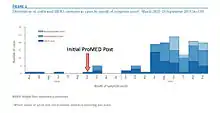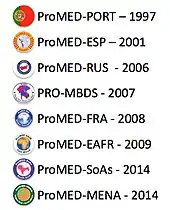ProMED-mail
Program for Monitoring Emerging Diseases (also known as ProMED-mail, abbreviated ProMED) is among the largest publicly available emerging diseases and outbreak reporting systems in the world.[1] The purpose of ProMED is to promote communication amongst the international infectious disease community, including scientists, physicians, veterinarians, epidemiologists, public health professionals, and others interested in infectious diseases on a global scale. Founded in 1994, ProMED has pioneered the concept of electronic, Internet-based emerging disease and outbreak detection reporting.[2] In 1999, ProMED became a program of the International Society for Infectious Diseases. As of 2016, ProMED has more than 75,000 subscribers in over 185 countries.[3] With an average of 13 posts per day, ProMED provides users with up-to-date information concerning infectious disease outbreaks on a global scale.
 | |
| Developer | International Society for Infectious Diseases |
|---|---|
| Initial release | 1994 |
| Marketing target | Public health |
| Official website | www |
ProMED's guiding principles include:
- Transparency and a commitment to the unfettered flow of outbreak information
- Freedom from political constraints
- Availability to all without cost
- Commitment to One Health
- Service to the global health community
One of the essential global health priorities is the timely recognition and reporting of emerging and re-emerging infectious diseases. Early recognition can enable coordinated and rapid responses to an outbreak, preventing catastrophic morbidity and mortality. Additionally, early detection can alleviate grave economic hardship brought upon by pandemics and emerging diseases. Burgeoning globalization of commerce, finance, manufacturing, and services has fostered ever-increasing movement of people, animals, plants, food, and animal feed. Other contributing factors to the risk of new pathogens emerging and known pathogens re-emerging include climate change, urbanization, land use changes, and political instability. Outbreaks that begin in the most remote parts of the world now spread swiftly to urban centres in countries far away. The epidemiological data in ProMED posts has been used to estimate mortality rates and demographic parameters for specific diseases.[4][5]
The severe acute respiratory syndrome (SARS) outbreak in 2003 and the Middle East respiratory syndrome (MERS) outbreak in 2012 demonstrated the importance of early identification for emerging disease occurrences. The initial outbreak reports in both events were posted by astute clinicians. The use of non-traditional information sources can provide prompt information to the international community on emerging infectious disease problems that have yet to be officially reported.[6] The early dissemination of information may lead to rapid official confirmation of ongoing outbreaks.
The Epicore programme, launched in March 2016 by various organizations including the patrons of ProMED-mail, makes use of volunteers throughout the world to find and report outbreaks using non-traditional methods.[7]
History
Under the auspices of the Federation of American Scientists, ProMED-mail was founded in 1994 by Dr. Stephen Morse, then of Rockefeller University, Dr. Barbara Rosenberg of the State University of New York at Purchase, and Dr. Jack Woodall, then of the New York State Department of Health.[8] Originally envisioned as a direct scientist-to-scientist network, ProMED rapidly grew into a prototype outbreak reporting and discussion list, especially after the 1995 Ebola outbreak. The idea of a global network was first proposed by Donald A. Henderson in 1989.[9]
ProMED played a crucial role in identifying the SARS outbreak early in 2003.[10] An astute physician in Silver Spring, Maryland, Stephen O. Cunnion, MD, PhD, MPH, submitted the first report to the database for this emerging outbreak, allowing the ProMED community to track the outbreak nearly two months in advance of the worldwide alert.[11] The email read: “Have you heard of an epidemic in Guangzhou? An acquaintance of mine . . . reports that the hospitals there have been closed and people are dying.” It was one month later before the Chinese government officially acknowledged the outbreak.
In 2012, the users of ProMED were again some of the first to identify the outbreak of MERS. A physician was responsible for identifying the outbreak and reporting the event to the ProMED community, which was posted online.[12] Eight days after the initial report, the Saudi Health Ministry announced the diagnosis of a new form of coronavirus.
The ProMED-mail system grew from 1994 in parallel with Public Health Agency of Canada's similar Global Public Health Intelligence Network (GPHIN),[13].
At 23:59 on 30 December 2019, ProMED-mail received its first communication about the COVID-19 outbreak.[14]
On 3 August 2023, 21 out of the 38 paid moderators and editors for the service went on strike, citing lack of support from ISID.[15][16]
Disease surveillance and reporting



The importance of using unofficial sources of information for public health surveillance has become increasingly recognized.[18] Sometimes referred to as “event-based surveillance” or “epidemic intelligence,” informal disease reporting services, pioneered by ProMED, have become a crucial component of the overall global infectious disease surveillance picture.[19] According to the WHO Epidemic & Pandemic Alert & Response, more than 60% of the initial outbreak reports come from informal sources, including ProMED-mail.
ProMED-mail publishes reports to the website ProMEDmail.org in addition to sending e-mails to service subscribers. There is no cost for subscription to the reporting network. ProMED encourages subscribers to contribute data, respond to requests for information, and collaborate in outbreak investigations and prevention efforts.
Posts are published on a real-time basis. Reports detail infectious disease outbreaks with geotags and links to related media articles and other ProMED posts. Each report is screened and edited by a staff of expert moderators, ensuring the validity of the published information. There are 45 moderators for ProMED stationed throughout the world. Moderators review reports submitted within their region of oversight, drawing on their knowledge of the region and infrastructure to provide accurate descriptions of the outbreak event.
As ProMED-mail is an independent program of the non-government, nonprofit International Society for Infectious Diseases, this ensures the avoidance of delay or suppression of disease reporting by governments for bureaucratic or strategic reasons. To provide access to a global audience, versions of ProMED are available in several languages and cover different regions, including ProMED-ESP (Spanish), ProMED-PORT (Portuguese), ProMED-RUS (Russian), ProMED-FRA (French), ProMED-MENA (Middle East and North Africa), ProMED-SoAs (South Asia and Arabic Summaries), as well as English-language versions ProMED-MBDS (Mekong Basin region of Southeast Asia) and ProMED-EAFR (Africa).
One Health
One Health is the principle that human, animal, and environmental health are inextricably linked and should no longer be researched and learned in a siloed manner.[20] ProMED embodied this concept in the sphere of infectious disease reporting since its inception. It is estimated that 70% of emerging human diseases originate in other animal species – termed zoonotic diseases. As diseases in both animal and agriculture species have health implications for humans, ProMED includes posts on emerging animal diseases and diseases related to agriculturally important plants due to their impact on human survival.
Collaborations
ProMED-mail and HealthMap were awarded a grant from Google.org's Predict and Prevent initiative in October 2008. This collaboration combined ProMED-mail's global network of human, animal, and ecosystem health specialists with HealthMap's digital detection efforts.
References
- Brownstein, John S.; Freifeld, Clark C.; Madoff, Lawrence C. (21 May 2009). "Digital Disease Detection — Harnessing the Web for Public Health Surveillance". New England Journal of Medicine. 360 (21): 2153–2157. doi:10.1056/NEJMp0900702. PMC 2917042. PMID 19423867.
- Times, Los Angeles (13 January 2007). "Website for the germ-obsessed". Los Angeles Times. Archived from the original on 11 June 2016. Retrieved 20 May 2016.
- "ProMED-mail". www.promedmail.org. Archived from the original on 1 June 2015. Retrieved 21 May 2016.
- Nasner-Posso, KM; Cruz-Calderón, S; Montúfar-Andrade, FE; Dance, DA; Rodriguez-Morales, AJ (June 2015). "Human melioidosis reported by ProMED". International Journal of Infectious Diseases. 35: 103–6. doi:10.1016/j.ijid.2015.05.009. PMC 4508390. PMID 25975651.
- Ince, Y; Yasa, C; Metin, M; Sonmez, M; Meram, E; Benkli, B; Ergonul, O (September 2014). "Crimean-Congo hemorrhagic fever infections reported by ProMED". International Journal of Infectious Diseases. 26: 44–6. doi:10.1016/j.ijid.2014.04.005. PMID 24947424.
- Keller, M; Blench, M; Tolentino, H; Freifeld, CC; Mandl, KD; Mawudeku, A; Eysenbach, G; Brownstein, JS (May 2009). "Use of unstructured event-based reports for global infectious disease surveillance". Emerging Infectious Diseases. 15 (5): 689–95. doi:10.3201/eid1505.081114. PMC 2687026. PMID 19402953.
- "ProMED Experts Share their Insights on Disease Surveillance and EpiCore | Skoll Global Threats Fund". www.skollglobalthreats.org. Archived from the original on 11 June 2016. Retrieved 21 May 2016.
- Madoff, LC; Woodall, JP (2005). "The internet and the global monitoring of emerging diseases: lessons from the first 10 years of ProMED-mail". Archives of Medical Research. 36 (6): 724–30. doi:10.1016/j.arcmed.2005.06.005. PMID 16216654. Archived from the original on 2020-04-12. Retrieved 2019-07-05.
- Morse, SS (February 2014). "Public Health Disease Surveillance Networks" (PDF). Microbiology Spectrum. 2 (1): OH–0002–2012. doi:10.1128/microbiolspec.OH-0002-2012. ISBN 9781555818425. PMID 26082122. S2CID 42392092. Archived from the original (PDF) on 2020-02-12.
- Yong, Ed (2011). "Disease trackers". BMJ. 343: d4117. doi:10.1136/bmj.d4117. PMID 21729998. S2CID 45190534.
- "Promed Post". Archived from the original on 2015-11-21. Retrieved 2015-11-20.
- "Promed Post". Archived from the original on 2015-11-21. Retrieved 2015-11-20.
- Bond, Katherine C.; MacFarlane, Sarah B.; Burke, Charlanne; Ungchusak, Kumnuan; Wibulpolprasert, Suwit (2013). "The Evolution and Expansion of Regional Disease Surveillance Networks and Their Role in Mitigating the Threat of Infectious Disease Outbreaks". Emerging Health Threats Journal. 6: 19913. doi:10.3402/ehtj.v6i0.19913. PMC 3557911. PMID 23362414.
- "UNDIAGNOSED PNEUMONIA - CHINA (HUBEI): REQUEST FOR INFORMATION". No. Archive Number: 20191230.6864153. ProMED-mail. 2019-12-30. Archived from the original on 2020-11-22. Retrieved 2020-11-23.
- Reardon, Sara (4 August 2023). "Long-running ProMED email service for alerting world to disease outbreaks is in trouble". Science. American Association for the Advancement of Science. Archived from the original on 6 August 2023. Retrieved 7 August 2023.
- Kozlov, Max (10 August 2023). "Key alert system for disease outbreaks is in crisis — can it be saved?". Nature. 620 (7974): 476–477. Bibcode:2023Natur.620..476K. doi:10.1038/d41586-023-02539-z. ISSN 1476-4687. PMID 37563475. S2CID 260807083. Archived from the original on 13 August 2023. Retrieved 14 August 2023.
- Penttinen, P. M.; Kaasik-Aaslav, K.; Friaux, A.; Donachie, A.; Sudre, B.; Amato-Gauci, A. J.; Memish, Z. A.; Coulombier, D. (September 26, 2013). "Taking stock of the first 133 MERS coronavirus cases globally – Is the epidemic changing?". Eurosurveillance. 18 (39): 20596. doi:10.2807/1560-7917.ES2013.18.39.20596. PMID 24094061.
- Chan, EH; Brewer, TF; Madoff, LC; Pollack, MP; Sonricker, AL; Keller, M; Freifeld, CC; Blench, M; Mawudeku, A; Brownstein, JS (14 December 2010). "Global capacity for emerging infectious disease detection". Proceedings of the National Academy of Sciences of the United States of America. 107 (50): 21701–6. Bibcode:2010PNAS..10721701C. doi:10.1073/pnas.1006219107. PMC 3003006. PMID 21115835.
- Keller, M; Blench, M; Tolentino, H; Freifeld, CC; Mandl, KD; Mawudeku, A; Eysenbach, G; Brownstein, JS (May 2009). "Use of unstructured event-based reports for global infectious disease surveillance". Emerging Infectious Diseases. 15 (5): 689–95. doi:10.3201/eid1505.081114. PMC 2687026. PMID 19402953.
- "ProMED-mail and ONE HEALTH" (PDF). One Health Initiative. Archived (PDF) from the original on 16 August 2016. Retrieved 20 May 2016.